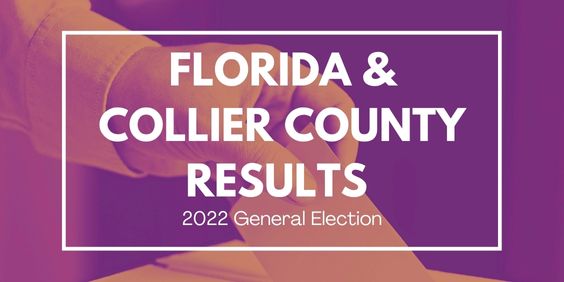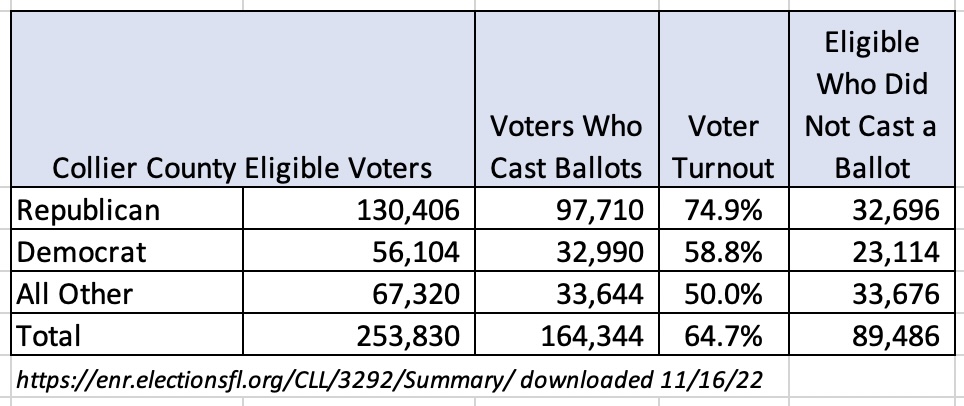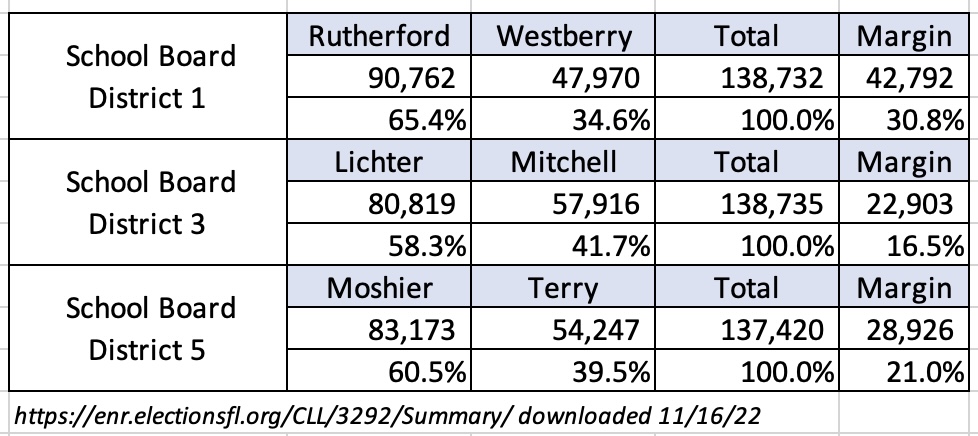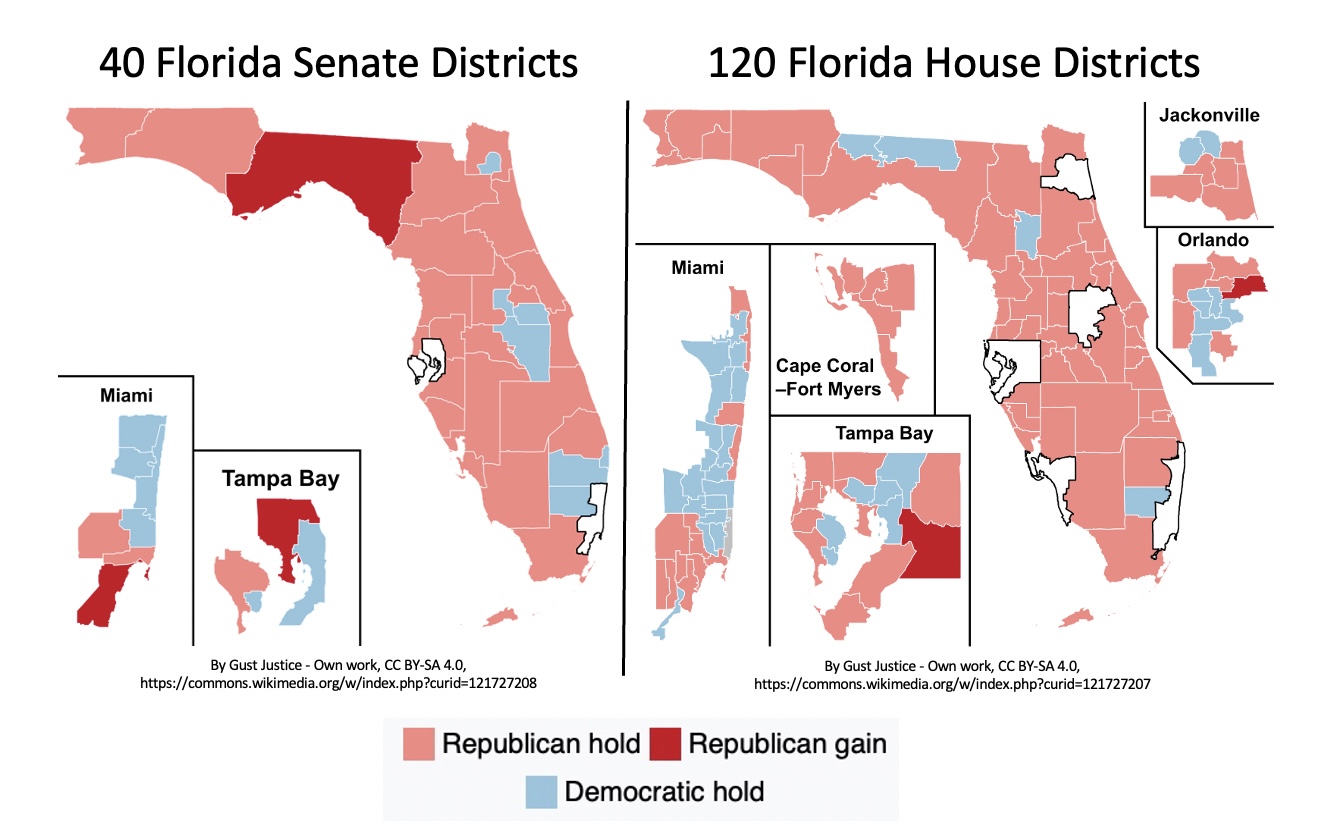
Republicans won all the partisan elections on Collier County voters’ ballots and the more conservative candidates won all the nonpartisan races. I assume you’ve seen the results (click here for statewide results and here for Collier County results), so in this post, I’ll dive a little deeper.
First, I’ll summarize available data about voter turnout. Next, I’ll share my thoughts about the implications for public policy and briefly comment on the results of the local races I wrote about on Sparker’s Soapbox. Finally, I’ll compare how Collier County voted with the statewide results to show Collier County in a broader context.
My goal is to give you a deeper understanding of the results and how they might affect our local and state governments, both now and in the future. With this understanding, I hope you’ll want to stay informed in the months ahead. If we don’t monitor what our elected officials do while in office, we won’t be informed enough to reward or hold them accountable in 2024.
Voter Turnout
Statewide, voter turnout in the 2022 midterm elections was about 54%, according to preliminary results from the state Division of Elections. In Collier County, roughly 65% of nearly 254,000 registered voters cast a ballot, according to preliminary results from the Collier County elections office.
Those figures are significantly lower than the 63% (Florida) and 73.5% (Collier County) turnout in the previous (2018) midterms.
About 75% of Collier’s registered Republicans cast a ballot, compared to roughly 59% of Democrats. Looking at the numbers: nearly three times as many registered Republicans went to the polls as registered Democrats. Barely half the people who are not affiliated with either party turned out at all.

Especially in the local School Board races, that difference mattered. The number of votes by which the challengers beat the incumbents (“Margin” in the table below) is significantly less than the total number of eligible voters who did not vote (“Eligible Who Did Not Cast a Ballot” in the table above). Voter turnout and get-out-the-vote efforts matter.

Implications for Federal Policy
Florida is a swing state no more. If there was any doubt after the 2020 elections, this year’s elections erased it.
In the U.S. Senate, Marco Rubio easily defeated challenger Val Demings in a statewide red wave as Republicans bulldozed Democrats up and down the ballot. Demings, a congresswoman from Orlando, had been widely viewed as Democrats’ best shot at winning a statewide election this year. (Incumbent Marco Rubio routs Val Demings in Florida U.S. Senate race, City & State Florida, 11/8/22)

In the U.S. House, Republicans increased their number of seats in Florida’s congressional delegation from 16 to 20.
During the last legislative session, DeSantis vetoed the Legislature’s proposed maps and sent lawmakers back to vote on a map drafted by his office that more aggressively favored Republicans. Watchdog groups filed a lawsuit arguing the map violated both the state Constitution and the Voting Rights Act, but the courts chose not to hear the case before the election. The lawsuit is ongoing, and the governor’s staff could be deposed. (DeSantis’ congressional map helped Republicans to U.S. House majority, but how much?, Miami Herald, 11/17/22)
Republicans in Florida and nationally are now praising the governor for strong-arming his own party to approve his congressional maps, which essentially helped the GOP win the tiny House majority. (GOP to DeSantis: Thanks for helping us flip the House, Politico, 11/17/22)
The emphatic victories by Republican candidates cemented Florida’s shift to the right. They sent a blaring signal that what once was the nation’s bellwether swing state is firmly red and potentially slipping out of reach for Democrats in the 2024 presidential contest. (Florida lurches to the right, crushing Democrats ahead of 2024, Washington Post, 11/9/22)
Implications for State Policy
As with Florida’s congressional delegation, its state government is also more firmly in Republican hands.
Executive Branch
With the widest margin in a Florida gubernatorial race since Jeb Bush won by nearly 13 points in 2002, DeSantis beat Democrat Charlie Crist by almost 20 points, setting him up for a probable presidential run. (DeSantis wins big, with an eye toward 2024, Politico Florida, 11/8/22)
“We will never surrendur to the woke mob!,” DeSantis declared in his election night victory speech. “Florida is where woke goes to die!”
DESANTIS: “We will never ever surrender to the woke mob! Florida is where woke goes to die!” pic.twitter.com/hgnEAyOqj7
— Townhall.com (@townhallcom) November 9, 2022
DeSantis will officially lay out his priorities for his second term as governor in a State of the State address before the start of the 2023 Legislative session on March 7.
He has signaled that he wants to crack down on “woke” banking practices, increase restrictions on abortion and loosen the unanimous jury requirement for people to be sentenced to death. In addition to emphasizing social issues, DeSantis is expected to work with the Legislature on one of the state’s biggest unaddressed crises: affordable housing. (What Florida could expect from Ron DeSantis’ second term, Tampa Bay Times, 11/9/22)
In other results, the Florida Cabinet returned to single-party control. Outgoing Senate President Wilton Simpson succeeded Democrat Nikki Fried as Commissioner of Agriculture, and incumbent Attorney General Ashley Moody and incumbent Chief Financial Officer Jimmy Patronis won second terms.
Legislative Branch
Republicans won supermajorities in both the Florida House and the Florida Senate, giving GOP leaders unfettered control over the legislative process with the largest electoral margins in a decade. (Red wave sweeps in supermajorities in Florida Legislature, Miami Herald, 11/8/22)

Republican leaders may use those majorities to waive the rules of the lawmaking process, approve last-minute amendments, and limit not only transparency but debate. (Takeaways from Tallahassee — Unfettered command, Florida Politics, 11/12/22)
One rule change already announced: House members will no longer need to file individual bills for appropriation projects to ensure they’re placed in the budget process, so they will no longer need to be heard in committee. (New House rules: No need for appropriations bills, Florida Politics, 11/18/22)
Florida Senate

In terms of her personal agenda, incoming Senate President Kathleen Passidomo, R-Naples, has said in interviews that her number one priority is addressing the lack of safe, affordable housing for the workers in our state. She wants to develop rental housing for middle-income workers using creative solutions, such as repurposing vacant strip malls, mixed-use communities, and tax incentives for developers to build units at affordable rates. Another priority is the expansion of the Florida Wildlife Corridor, where she wants the state to build a bike path. (What Florida lawmakers say they’ll do next on abortion, ‘wokeness’ and guns, Tampa Bay Times, 11/11/22)
As Senate President, Passidomo will have significant power over the legislative agenda. In her election night statement, she said that the election results are “a definitive win for parental rights, fiscal responsibility, access to world-class education opportunities for our students including school choice, protecting our children and the unborn, and ensuring government is never able to strip anyone of the dignity of work or their right to worship…. [H]ardworking families chose Florida values over the radical, socialist agenda that ridicules work, defames law enforcement, indoctrinates children, and cancels anyone who dares to challenge this backward vision for humanity.”
Florida House

A similar tilt can be expected in the Florida House. Incoming Speaker Paul Renner, R- Palm Coast, campaigned as “A Conservative Leader We Can Trust.” In a post-election tweet, he said, “The Florida House will continue to pursue a bold, conservative agenda … that gives citizens more freedom and opportunity to achieve their American Dream.” His priorities include hurricane recovery, tax relief, addressing rising insurance costs, and affordable housing. Regarding the latter, he said options include extending the homestead exemption and expediting the availability of housing stock. (What Florida lawmakers say they’ll do next on abortion, ‘wokeness’ and guns, Tampa Bay Times, 11/11/22)
Judicial Branch
The conservative learning of the Florida courts is also likely to continue. Voters retained all five Florida Supreme Court justices and 28 Appeals Court judges on the ballot to serve for six more years. (See results for each justice here and for each judge here.)
In the nearly 50-year history of the merit retention system, no Florida justice or appellate judge has failed to win a majority retention vote, although some have faced opposition.
Comments on Some Local Races
Board of County Commissioners

Republican Chris Hall will be the next Collier County Commissioner to represent District 2. He received 70 percent of the vote to Democrat Bebe Kanter’s 30 percent. No Democrat has won a Collier County election in more than 40 years.
Hall made local news in June for saying the Collier School Board has been “’infiltrated by weak leaders’ who push a liberal agenda and that the district should not be subject to gay leaders.” (Collier Commission candidate Chris Hall’s comments on schools, sexuality draw critics, Naples Daily News, 6/9/22)
“God, his word, love, and ways, (virtue) has to be reinstated in our nation, our states, our counties, and cities,” he said on his campaign website in explaining why he was running for county commission.
Hall will be sworn in before the next County Commission meeting on Dec. 13, along with incoming District 4 Commissioner Dan Kowal.

Kowal was elected in August on a pro-limited government, pro-second amendment, and pro-life platform. He said his key issues are clean water, safe streets, and sustainable growth. (Collier County Commissioner Elections: District 4, Sparker’s Soapbox, 7/21/22)
A far-right wing of the Collier County Republican Party took control in 2020 when its Executive Committee “unceremoniously dumped” Naples attorney Doug Rankin and elected Alfie Oakes, “the face of the anti-mask mandate movement in Collier County,” as the Party’s state committeeman. (Brent Batten: State committee races prove old adage about publicity, Naples Daily News, 8/20/20)
The Executive Committee also rejected the results of the 2020 presidential election.
Hall and Kowal will be joining continuing commissioners Rick LoCastro (District 1) and Bill McDaniel (District 5) who voted in favor of a proposed Bill of Rights Sanctuary County Ordinance last year. That ordinance was described as “the culmination of a months-long process to protect gun owner rights in Collier County.” Like LoCastro and McDaniel, Burt Saunders (District 3), who voted against the ordinance, also has two years remaining in his term. (Proposed Sanctuary County Ordinance Fails on 2-3 Vote, Sparker’s Soapbox, 7/14/21)
Collier County School Board
In the nonpartisan School Board elections, the three incumbents were ousted by wide margins by challengers endorsed by the Christian Conservative Coalition and Collier County REC. (See chart above.)
As outlined in an earlier post, these local School Board elections took place within three broader, nation- and statewide contexts: the politicization of School Board races; candidates’ unwillingness to participate in debates; and nascent antisemitism.
Within days of the election, District 1 representative Jerry Rutherford was making news. It has since been widely reported that he said, the morning after the election, that he wants to bring corporal punishment back to district classrooms and that disabled students’ behavior in particular is “out of control.” (Collier school board’s Jerry Rutherford says he wants to bring back corporal punishment, Naples Daily News, 11/11/22)
In a news release addressing the Naples Daily News report, Rutherford elaborated on his remarks. “Many stakeholders are unaware that Florida law, like the laws in many other states, permits corporal punishment. That being said, it is not my intent to call for Collier County to adopt a corporal punishment policy. My objective and hope,” he continued, “is to have a constructive and long overdue discussion with our public school stakeholders, especially with our teachers, about how we can best help and support our teachers and students to improve the learning environment in our classrooms.”
Regarding the remark about disabled students, he said, “Teachers should be able to teach without disruptive students. And students should be able to learn without disruptive students stealing their education…. I intend to work with my fellow board members to oversee the Superintendent, ensuring that he or she implements board policy and abides by the law to maintain high standards of discipline, morals, and love of country in our schools.”
In the coming months, the School Board will conduct a search and ultimately hire the District’s next Superintendent, develop the District’s next Five-Year Strategic Plan, review existing and proposed District policies, and approve the FY 2023-24 District Budget and tax rate.
The School Board will hold an Organizational Meeting at 8 a.m. on Dec. 2 to elect the next Chairman and Vice-Chairman and make assignments to several committees.
Collier County Compared to State as a Whole
Collier County continues to be far more conservative than the state as a whole. About half of Collier County’s registered voters are Republican, compared to just over a third in the state as a whole.

The percentages of Collier County votes for DeSantis and Rubio in the 2022 midterms compared to the state as a whole demonstrate even more clearly the County’s conservatism.

This broad conservatism is reflected in the County’s representation in government. All its representatives in local, state, and national government, except for the U.S. President, are Republicans.
By comparison, some Floridians, albeit a minority, do live in districts that are represented by Democrats. (See congressional, Florida Senate, and Florida House district maps, above.)
Conclusion
The 2022 midterm elections clearly show that the majority of Collier County and Florida voters support the policies espoused by the more far-right side of the Republican Party. Many do not accept that Joe Biden won the 2020 election.
Florida’s state government is likely to continue to push back against what they believe is federal overreach, and our representatives at the national level are likely to continue to oppose legislation to advance President Biden’s agenda.
Decisions made by the new Board of County Commissioners and School Board are likely to be different than they would have been under the previous ones, but exactly how that plays out bears watching.
I plan to do so. I hope you will, too.
